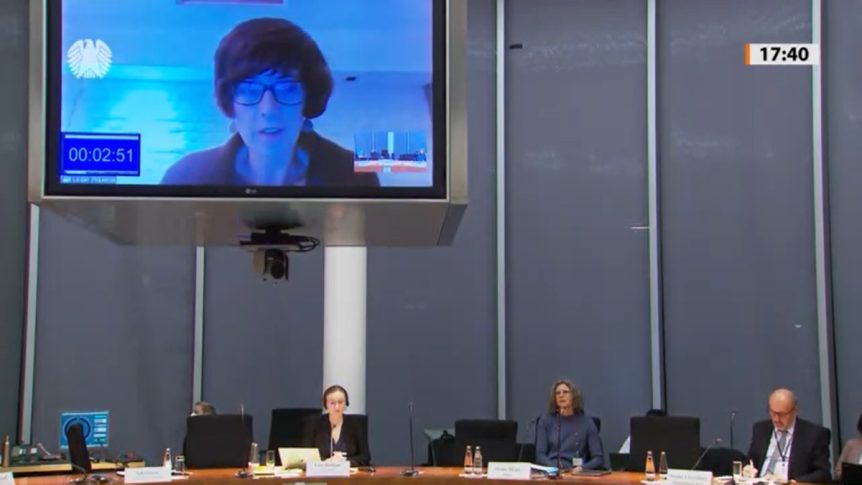At a meeting of the German Parliament (Bundestag) on 19 October, the Cairo Institute for Human Rights Studies (CIHRS) urged Germany to press for the de-escalation of the Egyptian government’s repression and targeting of activists, human rights defenders and civil society at large, including those working on environmental issues – state practices that are brazenly at odds with Egypt’s role as host of the United Nations Climate Change Conference (COP27). Speaking before the Bundestag’s Subcommittee on International Climate and Energy Policy, CIHRS Senior EU Advocacy Representative Leslie Piquemal underscored the need for sustained international pressure on the Egyptian government for lasting and genuine reform, including by opening civic space and ending the practice of mass arbitrary detention, according to the Egyptian human rights movement’s recommendations in their global petition.
Despite the country’s designation as host of the climate conference, the government of President Abdel Fattah al-Sisi continues to intensify a brutal human rights crackdown in which climate and environmental activists and groups are also ensnared. Environmental civil society actors interviewed by HRW reported a ‘sharp reduction in the space for independent environment and climate work’ under Sisi, as well as ‘harassment and intimidation tactics, including arrests and difficulties travelling, creating a general atmosphere of fear.’
UN experts issued a statement less than two weeks ago warning that the severe restrictions imposed by Egyptian authorities are already hindering the full and meaningful participation at the COP27 of journalists, activists, human rights defenders, civil society, youth groups, and indigenous peoples’ representatives. Independent regional and Egyptian rights NGOs, including CIHRS, have been refused access to the ad hoc and arbitrary process set up by the Egyptian authorities to have the UNFCCC give COP27 access only to government-selected NGOs from Egypt.
Such restrictions on access to the COP27 occur in a context of a severe human rights crisis in Egypt, as draconian legislation serves to clampdown on real and perceived opposition to the authoritarian Sisi regime. The severity of repression in the country is arguably unrivaled in Egypt’s modern history, with all democratic gains of the 2011 revolution rolled back . Vulnerable groups, including the LGBTQI+ community, continue to be targeted by state authorities. Meanwhile, the Sisi government pays lip-service to international human rights standards while enacting limited and superficial measures to appease the international community.
The case of imprisoned environmental and human rights defender Ahmed Amasha was highlighted by CIHRS during the meeting. A veterinarian, trade unionist, and member of a democratic opposition group, Amasha was detained and forcibly disappeared twice, and allegedly tortured. The European Parliament called for his immediate release in December 2020, yet he remains behind bars, like others mentioned in the EP urgency resolution including Zyad el-Elaimy, Mohamed El-Baqer, Mohamed ‘Oxygen’ Ibrahim, Ezzat Ghoneim as well as Alaa Abdelfattah, who has now been on hunger strike for over 200 days and is at risk of death. The importance of expressing solidarity with Egyptian activists, civil society & prisoners of conscience was underlined by CIHRS during an exchange with MdB Kathrin Henneberger.
Subcommittee members from the SPD, CDU/CSU, FDP and Greens/Alliance 90 parliamentary groups, as well as Chair Lisa Badum, expressed concern over the bleak outlook for human rights in Egypt, and focused questions and comments on policy options to respond to the issue, during and after COP27. Several also questioned whether the UN Climate Conference ought to be hosted at all by any State with an alarming rights record and harsh restrictions on civic space.
International community action cannot end when the conference does, CIHRS emphasized during the meeting, as Egypt has a record of targeting and reprisals against persons engaging with UN mechanisms. A number of political prisoners released in 2022 have been quietly threatened with re-arrest after the COP. Thus Germany and other states and actors with genuine commitment to human rights principles must continue to actively monitor the situation in Egypt and respond to any reprisals or potential re-arrests of those impacted by the limited prisoner releases in 2022.
CIHRS recalled that Germany is a major international partner and creditor of Egypt, and ought to enhance human rights conditionality in its support to Egypt, be it at the bilateral and EU levels, or through international or European financial institutions. Germany also ought to move to ensure action by states at the UN Human Rights Council on Egypt’s alarming rights record. Furthermore, great care should be taken in regards to any financial mechanism intended to counter the adverse impacts of climate change, so that such support does not inadvertently strengthen autocratic regimes like Egypt’s.
Ultimately, without any independent monitoring or checks and balances – whether it be through free civil society, media, or peaceful opposition – there will be no real way for Egyptians to hold their own government accountable to its climate pledges after COP27. Climate justice cannot be achieved if human rights are not upheld or civic space protected; today it is more vital than ever to push back against any claim asserting an artificial separation of human rights from climate issues.
Share this Post

